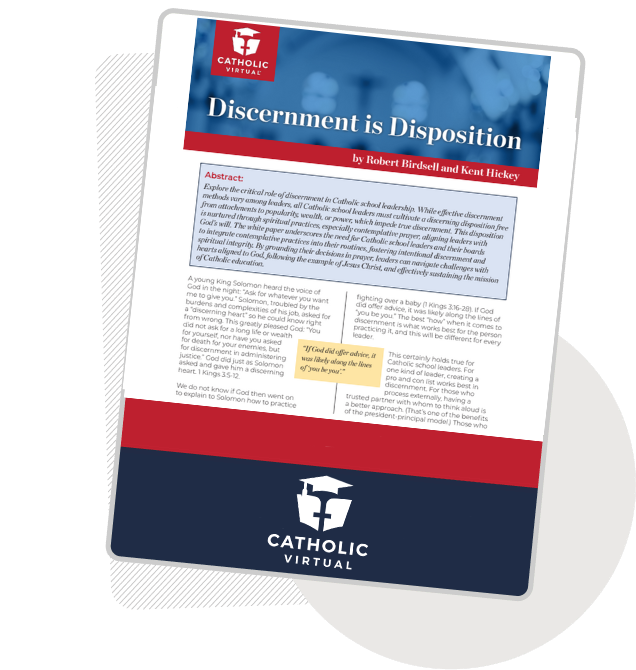The Discerning Dispositions Spiritual Leaders Need
Second in a Series on Spiritual Leadership
July 2024
Today’s Catholic school leaders balance many responsibilities. Practicing discernment is at the heart of their most important role: spiritual leader. While the methodology of practicing discernment will differ for each unique individual, it is the commitment to discernment that is at the heart of effective spiritual leadership.
In this article, you will learn about the importance of the process of discernment for today’s spiritual leaders. Explore ways to prioritize this commitment to discernment. Plus, download a white paper with concrete ways to practice discernment through the example of Jesus, the saints, and the Church’s great minds.
A Commitment to Discernment
What is discernment, from a Catholic perspective? Discernment is a process. Through discernment, we seek spiritual understanding and the wisdom to make decisions according to God's will. Discernment involves prayerful reflection, listening to the Holy Spirit, and considering our own motivations and choices. Discernment also involves seeking the guidance from Sacred Scripture, the teachings of the Catholic Church, spiritual directors, and the community of faith.

In their white paper, Discernment is Disposition, authors Rob Birdsell—President of Catholic Virtual, host of the podcast,
The Next Class 2.0, Founder & Executive Director of the Institute for Leadership and Entrepreneurship in Education (ILEE)—and Kent Hickey—Director of Leadership Formation at ILEE and the author of 40 Days With God, published by Paraclete Press—draw from the wisdom of great Catholic minds on the topic and importance of discernment. Discover practical suggestions for spiritual leaders that support discernment through personal prayer, access to spiritual direction, and immersion experiences in communities.
The “Why” of Discernment is Universal
Catholic school leaders are busy, and they wear many hats: business leader, head of school, enrollment manager, board member, academic leader. Yet the most important part of a president’s job is the spiritual leadership of the school and conveying that spiritual leadership to the community. Discernment is an integral aspect of this leadership responsibility for all Catholic school leaders. Catholic school leaders are first and foremost spiritual beings. Making time for the discernment process is a critical priority. As school leaders, it is essential to continually make time for this process, to cultivate a discerning disposition, and to let all of our decisions be guided by the will of God.
The “How” of Discernment is Personal
Methodology (the “how”) will differ when it comes to discernment for each of us, and it should. There are foundational principles of discernment (for example prayer, Scripture, and Church teachings), but the process of discernment will and must vary for everyone. Each Catholic school leader’s discernment is unique, depending on the preferences and leanings of the individual and their unique relationship with God.
Here are some contemplative practices that all school leaders can utilize in the personal process of cultivating a discerning disposition.
Contemplative Prayer
Contemplative prayer is the path to a discerning disposition. This form of prayer emphasizes silent communion with God in which we open ourselves to God’s presence and listen attentively. Through this meditative practice, we seek to encounter God through stillness and inward attentiveness and not thoughts or words. The goal of contemplative prayer is allowing God to communicate with us in profound, transformative ways.
Contemplative practices require stillness and time. Therefore, school leaders must devote the necessary time to practicing contemplative prayer, recognizing its importance to their discerning dispositions.
Jesus as Guide
Jesus is a model for all that we do as Catholics, and certainly as spiritual leaders navigating often tenuous and demanding roles. Jesus is our example for our relationship with God and service to others. Jesus was deeply contemplative and provides us an example for taking the time to withdraw and to pray.
Daily Prayer
Some contemplative practices are best achieved regularly but not required daily. Like Jesus we can retreat to a quiet place to pray for an entire day on an annual retreat. Each month, we might commit to diving into a spiritual book, practicing Lectio Divina with the Bible, or meeting with a spiritual director. But there is something that spiritual leaders can and must do every day: pray at least 30 minutes.
More Spiritual Support for School Leaders
Revisit the first article in this series on spiritual leadership, Become the Spiritual CEO Your Catholic School Needs: Navigating Challenges and Embracing Formation for Effective Spiritual Leadership, and download a helpful white paper, An Empty Chair at the Catholic School Table offering concrete ways to lead spiritually.
Also, don’t miss the compelling conversation about spiritual leadership in The Spiritual CEO of Your Catholic School panel discussion, led by Rob Birdsell. In it, Michael Gomez, Jill Platt, and Kent Hickey share ideas and tips for spiritually leading your school or dioceses with confidence.
More Articles




Accreditations and affiliations ensuring a world-class online and blended education




 Student Login
Student Login